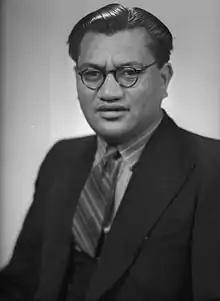Tapihana Paraire Paikea
Tapihana Paraire "Dobby" Paikea (26 January 1920 – 7 January 1963), also known as Dobson, was a New Zealand politician and Ratana morehu who won the Northern Maori electorate for Labour in 1943. He was a Māori of Te Roroa, Te Parawhau] and Ngāti Whātua descent.[1] He was elected following the death of his father Paraire Karaka Paikea who had been the MP, and he held the parliamentary seat until his own death in 1963.
Tapihana Paraire Paikea | |
|---|---|
 | |
| Member of the New Zealand Parliament for Northern Maori | |
| In office 1943 – 7 January 1963 | |
| Preceded by | Paraire Karaka Paikea |
| Succeeded by | Matiu Rata |
| Personal details | |
| Born | 26 January 1920 Rangiatea, Kaipara, New Zealand |
| Died | 7 January 1963 (aged 42) Oneriri, Kaiwaka, Kaipara, New Zealand |
| Relations | Paraire Karaka Paikea (father) |
Early life
A foundation pupil of the Ratana Pa school, Paikea started work in the Native Affairs Ministry. He led the Ratana Morehu Brass Band, and organised the special train which took the Ratana followers from the Tai Tokerau area in the Far North to Ratana for the annual festivals.
Political career
| New Zealand Parliament | ||||
| Years | Term | Electorate | Party | |
| 1943–1946 | 27th | Northern Maori | Labour | |
| 1946–1949 | 28th | Northern Maori | Labour | |
| 1949–1951 | 29th | Northern Maori | Labour | |
| 1951–1954 | 30th | Northern Maori | Labour | |
| 1954–1957 | 31st | Northern Maori | Labour | |
| 1957–1960 | 32nd | Northern Maori | Labour | |
| 1960–1963 | 33rd | Northern Maori | Labour | |
Paikea was elected to replace his father at the 1943 general election on 24 September 1943. A by-election was to have been held on 19 June 1943,[2] with two candidates, Paikea and Mr Samuel W. Maioha of Russell.[3] But when the government announced a September general election,[4] the requirement to hold a by-election was then avoided by a special Act of Parliament; the By-elections Postponement Act 1943, passed on 11 June 1943.
Paikea promoted Ratana and Maori issues. His maiden speech covered the economic and social contribution of the Maori war effort, Maori cultural pride and equal treatment for Maori and Pakeha. As a Member of Parliament for the Far North and based in Auckland, Paikea had a special emphasis for Tai Tokerau land claims and the needs of Maori moving to the city.
He remained a Member of Parliament for Northern Maori until his own death on 7 January 1963.[5]
Notes
- https://teara.govt.nz/en/biographies/5p6/paikea-tapihana-paraire
- "News of the Day - Vacant Maori Seat". The Evening Post. CXXXV (118). Wellington. 20 May 1943. p. 4. Retrieved 18 March 2014.
- "Northern Maori Seat". The Evening Post. CXXXV (130). Wellington. 3 June 1943. p. 3. Retrieved 18 March 2014.
- "SEPTEMBER POLLS, General Election - Position of Vacant Seats". Auckland Star. LXXIV (137). 11 June 1943. p. 2. Retrieved 18 March 2014.
- Wilson, James Oakley (1985) [First ed. published 1913]. New Zealand Parliamentary Record, 1840–1984 (4th ed.). Wellington: V.R. Ward, Govt. Printer. p. 225. OCLC 154283103.
References
| Wikimedia Commons has media related to Tapihana Paraire Paikea. |
- Henderson, James Mcleod (1963). Ratana The Man, The Church, The Movement (1st ed.) A.H & A.W. Reed Ltd ISBN 0-589-00619-3.
| New Zealand Parliament | ||
|---|---|---|
| Preceded by Paraire Karaka Paikea |
Member of Parliament for Northern Maori 1943–1963 |
Succeeded by Matiu Rata |